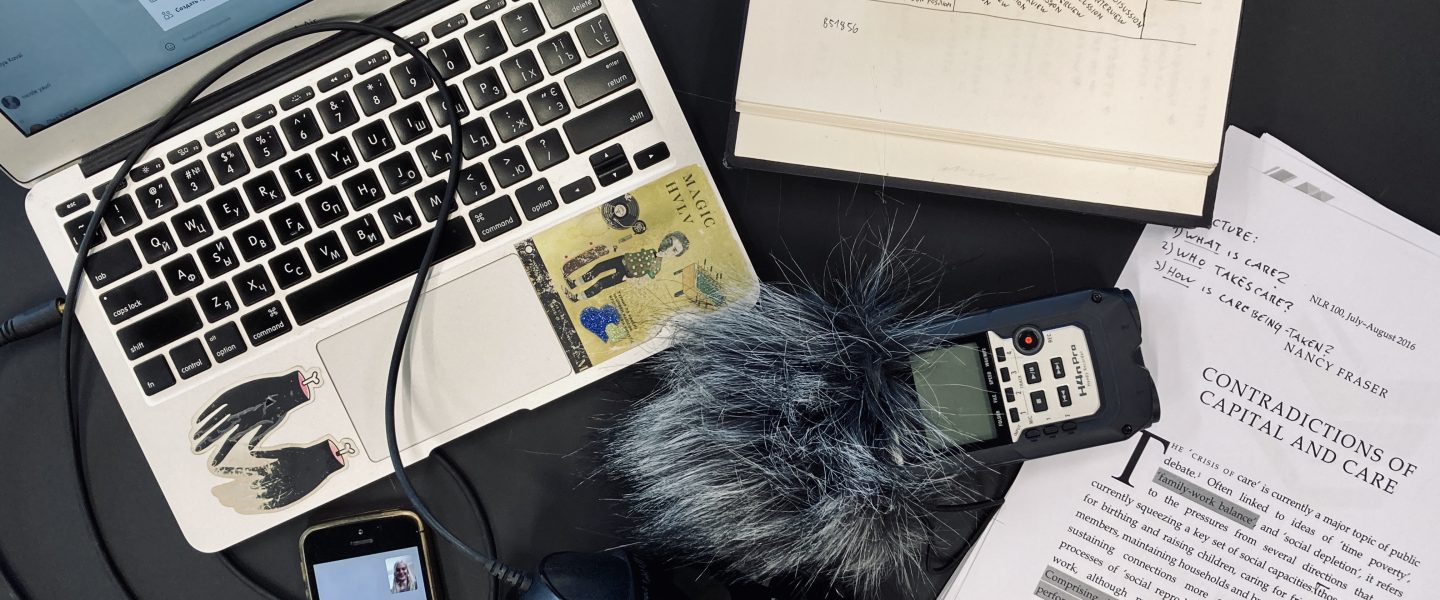
Taking Care of the Caretaker By Daria Khrystych, Dalma Pszota & Janosh Heydorn
The Urban Ethnography course tutored by Agata Marzec and Hanna Husberg takes the techno-ecologies of (hard or soft) urban infrastructure as a starting point to using ethnographic strategies make perceptible interdisciplinary phenomena that cannot be described from a disciplinary perspective. Participants are encouraged to develop collaborative research projects that explore boundary approaches to ethnography by critically employing creative and artistic research methods both in the research process and for conveying the results of the research. This year, the course was held online, and included group work and co-learning. The students were asked to approach their research projects through the prism of the techno-ecologies or infrastructure of care and maintenance. The four projects resulting from this process use ethnographic approaches in varied ways to explore structures of care and maintenance through the psychological, familial, sensual, spatial, socioeconomic, infrastructural and legislative.
The meeting will start 14:00 with a presentation by external reviewer Viktorija Šiaulytė, independent curator and producer working in the fields of contemporary art, architecture and film, followed by student presentations.
Zoom link: https://zoom.us/j/93356723589
By Daria Khrystych, Dalma Pszota & Janosh Heydorn
„Taking Care of the Caretaker“ is an audio podcast about grandmothers who take care of us, and who we care about. It is about the situation of being used to take care of the family – to take care of what Nancy Fraser understands as social reproduction – and still having a great share in it, but also increasingly depending on help from others. In this ethnographic research, we ask: How can grandparents give insights into how women experience the transformation from being the ones, who take care to the ones, who require care? We discuss with our grandparents their views on their situation inside family relationships of mutual caretaking and -receiving and how these relations changed over time and what impact the state care system has on this. The aim is not to compare and generalize their narratives, but rather to draw out personal, affective images of how they experience being in this particular situation in life.

Põhjala Factory case study: exercise in mapping the mundane and beyond
By Oleksandr Nenenko, Petra Duriskova and Marina Pushkar
This project was inspired by transparency/invisibility of infrastructure coherent to its very nature and its embeddedness into the prior/neighboring systems. It urged us to rethink the quite prominent manifestations of urban fabric transformation through inspecting the movement of regeneration of the old industrial sites. Once functioning factories, hidden at the outskirts of the city behind the closed doors used to be so-to-say “blind spots” on the urban fabric, perfectly functioning infrastructures kept producing rubber/plastic/metal, providing work places, while their presence was disguised, uninteresting and hidden from the eyes of the visitors of the city. Abandoned factories, remnants of the extinct industries, surfaced to the interest of developers as an ideal base for the erection of new “ hipstervilles”.
In our project we would like to research how these transformations influence the urban object’s interconnectedness into the urban fabric and what other changes this metamorphosis may facilitate. Inspecting this process we would attempt to address the objectifying aspect of care, raised by Puig de la Bellacasa, pointing out that “Thinking driven by love and care should be especially aware of dangers of appropriation”.

sense of loss to loss of sense
By Karlotta Sperling & Mira Samonig
:::in:::out::: air through my nose, oxygen into my blood; sustained living and being.
:::in:::out::: air through my nose, no sensual perception, emptied air through my nose, oxygen into my blood, no rebound in my limbic system; sustained living, impaired being.
What happens to us when we lose our sense of smell? This audio performance turns towards the post-pandemic future speculating about new emerging normalities, one of them might be a life without the ability to smell. The project investigates the sense of loss informed by feelings of uneasiness and uncanniness and its effects on a new everyday reality. It aims to drag the listener into our personal experiences and further into their individual venture of a yet to come.

